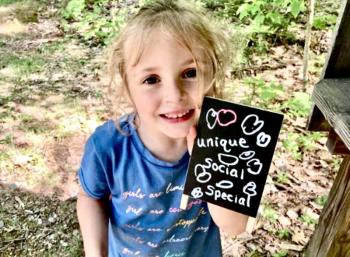Hearty Roots looks to fill Midcoast’s mental health needs
 Cairine Clark shares positive affirmations, the building blocks to resilience and esteem. Courtesy of Hearty Roots
Cairine Clark shares positive affirmations, the building blocks to resilience and esteem. Courtesy of Hearty Roots
 Lydia Crafts and daughter Kestrel canoe at Family Retreat. Courtesy of Hearty Roots
Lydia Crafts and daughter Kestrel canoe at Family Retreat. Courtesy of Hearty Roots
 Matthias Fanslau helps Adventure Mentor Misha Barker support Harper Atwood on the low ropes course during Sunbeam Session. Courtesy of Hearty Roots
Matthias Fanslau helps Adventure Mentor Misha Barker support Harper Atwood on the low ropes course during Sunbeam Session. Courtesy of Hearty Roots
 Cairine Clark shares positive affirmations, the building blocks to resilience and esteem. Courtesy of Hearty Roots
Cairine Clark shares positive affirmations, the building blocks to resilience and esteem. Courtesy of Hearty Roots
 Lydia Crafts and daughter Kestrel canoe at Family Retreat. Courtesy of Hearty Roots
Lydia Crafts and daughter Kestrel canoe at Family Retreat. Courtesy of Hearty Roots
 Matthias Fanslau helps Adventure Mentor Misha Barker support Harper Atwood on the low ropes course during Sunbeam Session. Courtesy of Hearty Roots
Matthias Fanslau helps Adventure Mentor Misha Barker support Harper Atwood on the low ropes course during Sunbeam Session. Courtesy of Hearty Roots
Hearty Roots (HR), a Bristol-based nonprofit dedicated to improving children’s lives through social-emotional learning and outdoor adventure programs, has launched a $1.5 million capital campaign for a Midcoast headquarters. Founded in 2017 by social worker and Edgecomb Eddy school counselor Haley Bezon to be “intentionally scrappy and mobile” operating out of the backs of cars and minivans, toting equipment day after day to several camp locations, HR now serves more children than the mobile model can support.
“This will be our biggest summer yet, over 300 kids this summer and on track to be 500 kids next summer,” Bezon said. Since expanding to year round camps and retreats, HR has offered 14 camps in four locations annually, she said. “Now, we’re setting down roots, giving kids a home to become stewards of themselves and the land.”
HR’s counselors are qualified, professional adults who have pursued careers in children’s mental health. Staff members’ credentials run the gamut of trauma-informed wellness, social-emotional learning, adventure education and social work.
“We believe nature-based intervention helps stem the tide of the mental health crisis that disproportionately affects Maine’s youth. Our non-clinical, therapeutic offerings have made an enormous impact on area youth, families, and our collective community,” reads the HR website.
HR is moving toward its goal of a permanent home with a sense of urgency. “It’s clutch time,” said Bezon. “We’ve applied for federal funding and will contact local townships for support and investment.” Their efforts come at a time when the U.S. Department of Justice has concluded Maine violates the Americans with Disabilities Act (ADA) by over-institutionalizing children with disabilities in a case brought by Disability Rights Maine.
“Justice Department Finds Maine in Violation of ADA For Over-Institutionalization of Children with Disabilities” (June 2022) at justice.gov states “Many children with disabilities in Maine, especially those in rural areas or with more intensive needs, are unable to live at home with their families due to a lack of community-based behavioral health services. These services can include assistance with daily activities, behavior management, and individual or family counseling. Community-based behavioral health services also include crisis services that can prevent a child from being institutionalized during a mental health crisis. Absent these services, Maine children with disabilities enter emergency rooms, come into contact with law enforcement, and remain in institutions when many of them could be at home if Maine put in pace sufficient community-based services.”
Further, the U.S. Surgeon General has reiterated findings from a 2021 report, “Protecting Youth Mental Health” on the dangers of prolonged screen time for youth under age 13. The 53-page report states, “The challenges today’s generation of young people face are unprecedented and uniquely hard to navigate. And the effect these challenges have had on their mental health is devastating.” One solution offered up in the report is more time outdoors.
In 2022, Maine published “Shared Community Health Needs Assessment Report,” which says “There is concern that the current health care workforce cannot meet mental health needs. This shortage of providers increases mental health emergencies and the use of the emergency department for care. A second key theme is a concern for youth mental health – depression, suicide ideation, stress/anxiety, and mental health impacts of adverse childhood experiences. In 2019, 32.1% of high school students and 24.8% of middle school students reported feeling sad or hopeless for two or more weeks in a row, while 16.4% of high school students and 19.8% of county middle school students seriously considered suicide.” These are pre-pandemic numbers.
For Shannon Parker, HR parent and coordinator of the capital campaign, the path forward is clear. “Children make adults be our best selves. They ask us to show up. Show kindness. Care. And when it comes to mental health, they need us to do better. We can settle for a paralyzed system with too few providers; years-long waiting lists; high costs; sterile offices, and healthcare systems that don’t always recognize mental wellness as wellness. Or, we can reach through the noise to offer a hand to kids, a hand that will guide them into Maine’s wilds while helping them understand and accept all the beautiful complexities of being human. For me, that’s an easy choice. The only choice,” she wrote in an email to Boothbay Register.
As of May 22, HR has raised close to $400,000 toward its goal after receiving a $250,000 matching grant from the Peter Alfond Foundation. Boothbay business partners including the YMCA, Boothbay Region Land Trust and numerous other Midcoast foundations are showing their support for HR’s initiative. Donations are accepted via HR’s website, https://www.heartyroots.org/, and an enjoyable family-friendly fundraising event, Paddle for a Purpose, takes place Saturday June 3. Paddlers (canoes, kayaks, stand up paddle) launch from the town landing in Damariscotta and paddle five miles down the river to Glidden Point Oyster Farm for a reception with food, live music and festivities.







































